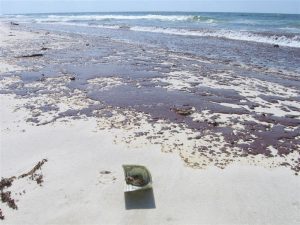Sociologists Link Lessons from Deepwater Horizon to Long-Term Coronavirus Impacts
– APRIL 30, 2020
Investigations into health impacts stemming from Deepwater Horizon may provide insights as to what we might anticipate later from the ongoing coronavirus pandemic. Tim Slack, professor in the Louisiana State University’s Department of Sociology, describes how economic losses following the oil spill are linked to persistent negative health outcomes in an article marking the 10th anniversary of Deepwater Horizon: Lessons from the Deepwater Horizon Oil Spill Could Help Prepare for Long-Term Health Impacts of the Coronavirus Pandemic.
Slack explains that following the 2010 oil spill, damages to the natural ecosystems affected the communities and economies tied to those resources, such as fishing, tourism, and offshore drilling. Ongoing oil spill studies investigating long-term indirect impacts on people’s health, including children, suggest that the most persistent health consequences stem from loss of work and money, not from physical exposure to hydrocarbons. Slack sees the potential for a similar situation with socioeconomic fallouts from the coronavirus pandemic.
With grants* from the Gulf of Mexico Research Initiative (GoMRI), LSU sociologists began collecting data using the 2010-2013 Community Oil Spill Survey that focused on tracking resilience, vulnerability factors, and measures that could help. Later, the GoMRI-funded Consortium for Resilient Gulf Communities, led by the RAND Corporation, continued to track impacts between 2015 and 2019. In parallel, another GoMRI-funded study called Resilient Children, Youth, and Community, in collaboration with the National Center for Disaster Preparedness (NCDP) at Columbia University, continued to gather quantitative and qualitative data from the same respondents at multiple points in time, building off NCDP data from 2014 with follow-ups in 2016, 2017, and 2018.
The researchers in these studies put their oil spill research in a larger context of cumulative disaster and environmental stress, which coastal communities along the Gulf of Mexico have experienced.
* GoMRI Grants to LSU:
- Tracking Community Resilience in the Wake of the Deepwater Horizon Disaster: Assessing the Evidence
- Tracking Community Resilience in the Wake of the Deepwater Horizon Disaster: Developing Infrastructure for Analyzing the Human Impact on Coastal Communities
- Understanding the Social Impacts of the Deepwater Horizon Oil Spill in the Context of Community Vulnerability and Resiliency
Read more information related to this research:
- Study: Fishing Households Experienced Depressive Symptoms Despite Social Support after Oil Spill
- Study Improves Disaster Resilience Training for Community Health Workers
- Grad Student Keating Surveys Children and Families for Long-Term Oil Spill Impacts
- Grad Student Parks Assesses How Disasters and Social Factors Influence Human Health
- Grad Student Fiore Investigates Oil Spill Impacts on Gulf Economy and Fisheries Resiliency
By Nilde Maggie Dannreuther. Contact maggied@ngi.msstate.edu with questions or comments.
***********
The Gulf of Mexico Research Initiative (GoMRI) is a 10-year independent research program established to study the effect, and the potential associated impact, of hydrocarbon releases on the environment and public health, as well as to develop improved spill mitigation, oil detection, characterization and remediation technologies. An independent and academic 20-member Research Board makes the funding and research direction decisions to ensure the intellectual quality, effectiveness and academic independence of the GoMRI research. All research data, findings and publications will be made publicly available. The program was established through a $500 million financial commitment from BP. For more information, visit https://gulfresearchinitiative.org/.
© Copyright 2010-2020 Gulf of Mexico Research Initiative (GoMRI) – All Rights Reserved. Redistribution is encouraged with acknowledgement to the Gulf of Mexico Research Initiative (GoMRI). Please credit images and/or videos as done in each article. Questions? Contact web-content editor Nilde “Maggie” Dannreuther, Northern Gulf Institute, Mississippi State University (maggied@ngi.msstate.edu).






